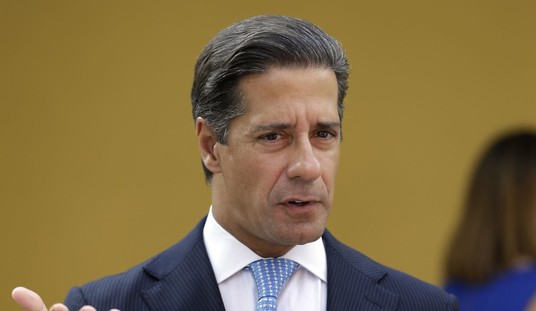Did political pressures lead to the firing of Andrew McCabe 26 hours before his pension would have begun? FBI Director Christopher Wray never does provide a direct answer to this question from NBC News’ Pete Williams in an interview that will air shortly on their nightly news program. However, Wray emphasizes that he made clear when he took the job that he would not be party to politicization of personnel matters:
“I am committed to doing things objectively and independently and by the book. I think that has to extend not just to our investigations, our intelligence analysis, but it also has to extend to personnel decisions and disciplinary decisions,” Wray told NBC News’ Pete Williams.
Wray said he was not addressing the details of McCabe’s termination, but maintained that he was committed to not allowing politics to be a factor in decisions at the FBI.
“I want to be careful about what I can say about the process” of McCabe’s firing, Wray said. “But I will tell you that my commitment to making sure that our process is followed, that it relies on objective input, and that most importantly, it is not based on political or partisan influence is something I am utterly unyielding on.”
In other words, Wray wants to offer a no-comment comment by indirectly telling Williams that politics didn’t play a role. Why not just say that? For one thing, it wasn’t Wray’s call; Jeff Sessions made the decision based on a process that supposed to be independent of the FBI Director. Some griped that it shouldn’t have been Sessions’ call either, given that he’d recused himself from the Russia-collusion probe. However, McCabe’s firing was a result of an Inspector General report into the Hillary Clinton e-mail investigation, not the Russia probe, and Sessions never recused himself from the former.
Wray has been publicly circumspect about his #2, but had hinted internally two months ago that McCabe’s problems had nothing to do with partisan politics. He pushed Wray to step out of leadership in late January after getting briefed on the IG’s initial findings. That was itself a major reversal from Wray’s reported threat to resign if anything happened to McCabe that got leaked out just a week before McCabe retreated.
With all that as context, this seems clear enough; Wray’s emphasizing that politics had nothing to do with McCabe’s termination. He wrote the same thing to FBI employees when announcing McCabe’s change in status — and his own change in posture on McCabe — in late January.
“It would be inappropriate for me to comment on specific aspects of the IG’s review right now,” Wray said in the message. “But I can assure you that I remain staunchly committed to doing this job, in every respect, ‘by the book.’ I will not be swayed by political or other pressure in my decision making.”
That still leaves open the question as to when it will be appropriate for Wray to discuss the IG’s findings. No one’s quite sure when it will emerge, but some of its content made its way into the Washington Post yesterday afternoon. It turns out that the IG thinks McCabe’s troubles with the truth started on the day his previous boss got fired:
The troubles that led to the ouster of Andrew McCabe as FBI deputy director began the same day that his boss, James B. Comey, was fired, when FBI investigators exploring media leaks approached McCabe for a conversation, people familiar with the matter said.
The investigators, who reported to McCabe, wanted to know about his dealings with the press, the people said. The Justice Department inspector general now thinks that McCabe was not completely truthful with them, the people added.
The episode figures prominently in a forthcoming inspector general report expected to allege that McCabe authorized a disclosure of information to the Wall Street Journal and then misled investigators about it. Though the Justice Department inspector general thinks that McCabe was not candid on multiple occasions — both under oath and not — the May 9 conversation is thought to be one of the first examples.
And now the length of time for the report to emerge suggests to some that the DoJ might be considering a prosecution of McCabe:
It is difficult to ascertain from what is known publicly so far whether McCabe’s alleged misdeeds could be criminal in nature. That the inspector general’s report is not yet released has fueled speculation inside the FBI and Justice Department, and on Capitol Hill, that prosecutors might be weighing a criminal case. If so, it is unlikely that the report would be made public until a decision has been made.
If McCabe lied to investigators, that would put him in the same position as Michael Flynn and George Papadopoulos. That may be the real reason Wray wants to keep his mouth shut, although he would have little to do with a prosecution effort. McCabe’s adventure with the DoJ may not be over by a long shot, and Wray doesn’t want to get caught up in the middle of it.








Join the conversation as a VIP Member